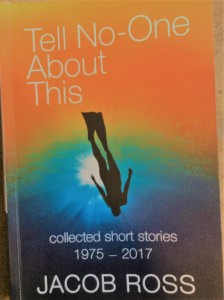These stories are page turners: tautly written tales, concerning subaltern characters, in real crisis, their backs to the wall against some external threat, some foe, their choices harsh. The stories grip. You want to know whether the characters emerge intact from their crisis. And emerge they usually do, though rarely completely intact. The stories are quietly moral – something hovers above them, holding out the promise that there is such a thing as justice, as a social contract, and that when it is broken by the powerful, then the ‘small’ people can and do have a right to fight back, and they have the intelligence and resources to do that, sometimes in surprising ways. De Laughing Tree is my favourite for this strand of storytelling, closely followed by A Different Ocean, both featuring resourceful, female protagonists: JR has a particularly deep commitment to creating space for women’s voices and his work often fuses technical craft with a quiet, caustic shaming of misogyny.
There is rarely a lazy line in Ross’s stories. He generally uses the third person, ‘He/She’. It better allows that barely perceptible oscillation between author and character – the sense that within one paragraph you are at once hearing the voice of the character and the almost imperceptible pulling away towards some quiet, allegorical, authorial statement. So Walking For My Mother begins:
“Old Hope turned out their children to watch Nella go. It was wonderful and frightening because the quiet in the air was all for her. All for her, the gifts, the utterances of pleasure, the sideways glances and sweat-rimmed smiles. Like they were seeing her properly for the first time.”
JR has the attention to language of a poet. One example will have to suffice. In Giving Up On Trevor, a woman walks past an alley and sees three young people. She notes they are ‘cowled.’ It’s a beautiful choice of word. I would have gone with hooded; but cowled, with its echo of a monk’s habit, quietly invites you to re-see, adds an undertow of religious piety to the troubled events that take place from this point. Of course, those events confuse and complicate such initial purity, but the starting point is important.
Most of the stories in the collection are set in what I take to be the Caribbean island of Grenada, JR’s country of birth, though Grenada is never named. Why that preponderance? The Canebreakers seems to provide a clue. When the young narrator discusses his leaving the island on a scholarship – a passport to the wider world – his sister sharply tells him: ”dem offerin you a ticket so you could up and leave – like your modder – alone – and never come back. Leave everybody else behind.” And later adds: “Learnin to escape cane not enough. How to break it – break out ov it, is what you have to learn. You unnerstan?” I understand this as somewhere between a plea and an admonition for those who leave to remember those people left behind, and to “break cane” for them: to speak of their lives, both internal and external. The Canebreakers is one of my favourite stories in the collection.
Tell No-One, is a collection of short stories. It is therefore, arguably, less commercial than a novel (for a novel try JR’s recent, prize-winning, The Bone Readers), but the stories here are flecks of gold. And through them JR shows himself a short story writer of the first order.
Hesitations:
The dateline of the subtitle (“Collected short stories 1975-2017”) suggested for me that the order of stories would be chronological, by date of creation. But there are few clues to what was written when. I found myself guessing which were the early works and creating my own meta-narrative of the movement from young Jacob Ross to mature Jacob Ross: was it a movement from optimism to cynicism, from dense syntax to short clear sentences, from ascetic realism to the numinous? Or maybe JR gets rich and the move is from a Marxist alignment with the voices of the oppressed to a concern with the lack of parking spaces in Chelsea? None of the above. I gave up guessing. The style and themes are remarkably consistent. Whether this is because everything has been given a contemporary edit or simply that the author’s concerns have remained constant, I can’t tell.
Even in JR’s description of villages, there is this sense of atomisation – of characters facing great danger and crises fundamentally alone. I ached for a story that showed a collaborative endeavour – a modern day Fuenteovejuna that might suggest the power of waging battles collectively, as well as individually. But I understand a writer is not a juke box: writers write what they write!
Why do short story collections not get reviewed much? I came across the blog of a retired professor of literature who did a six-paragraph critique of each of thirty stories in an anthology. It took him four blog posts to get through them all. I doff my cap to that professor.
Full disclosure: I met Jacob Ross this year while on a writers’ visit to Portugal & Spain. As far as I can recall, he did not buy me any drinks.



